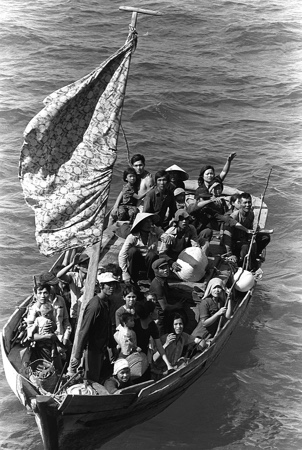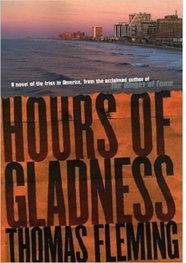Channeling George: Whatever Happened to the Boat People?

Are you ready for some tough questions?
You don’t ask any other kind Mr. President.
Once upon a time there was a refugee crisis more than equal in numbers to the tens of thousands of fugitives from the civil war in Syria that have been inundating Europe. Arguments have been raging in the United States and other countries about accepting these people. Columnists and politicians have made comparisons to other mass migrations. The New York Times Magazine published an article lamenting that we have admitted only a few thousand of the Syrian refugees. But I have not seen a word about the boat people. I found myself wondering why.
Now that you mention it, I wonder too.
 For
those who are too young to remember the Vietnam War or who have
struggled to forget it for various reasons, the boat people were
refugees who wanted to escape from Communist Vietnam after the United
States withdrew in humiliating defeat in 1975. Estimates of the
number of boat people vary from 800,000 to 3,000,000.
For
those who are too young to remember the Vietnam War or who have
struggled to forget it for various reasons, the boat people were
refugees who wanted to escape from Communist Vietnam after the United
States withdrew in humiliating defeat in 1975. Estimates of the
number of boat people vary from 800,000 to 3,000,000.
That more than equals the number of current refugees from Syria
Why did so many people risk their lives in ramshackle boats buoyed only by the faint hope that they would be welcomed in nearby Asian countries? The Communists had sent at least 1 million people associated with the government of South Vietnam to reeducation camps where existence was as brutal as they could make it short of execution. Another million people, most of them city dwellers, were suspected of disloyalty and shipped to “new economic zones” where they would survive only if they cleared the jungle and grew crops. At least a hundred thousand people were executed without a trial – – a fate that struck terror into the hearts of their friends and families.
Did we try to help them?
At first the United States did not have even a single warship in Vietnam waters. Only the British, still in possession of Hong Kong, ordered their ships to try to help the first wave of boat people. Their fates were often harsh. Pirates frequently boarded their defenseless craft, raped all the women and stole what little money and possessions everyone had. One boat carrying 75 refugees was sunk by pirates; only one person survived. Pirates kidnapped 21 women from another boat, which then drifted helplessly for days. Survivors said at least 50 merchant vessels passed them, ignoring their pleas for help. An Argentine freighter finally took mercy on them and deposited them in Thailand.
That kind of experience didn’t stop the boat people?
A second wave of boat people continued the exodus. These were people who had sampled Communist rule and were ready to risk their lives to live elsewhere in some version of freedom. In 1981 a UN commission compiled statistics on what happened aboard over 500 boats. More than 578 women were raped, 228 abducted and 881 died of thirst or starvation. The UN commission later estimated that perhaps 400,000 boat people died at sea in the fifteen years of their attempts to escape the wonderful socialist paradise North Vietnam was inflicting on its people.
Did the UN do anything?
Twice the UN convened international commissions to deal with the problem. Each time they attempted to browbeat neighboring Asian countries such as Malaysia, the Philippines and Thailand into accepting large numbers of refugees. Their people resented the intruders and often reacted with violence. It was not unlike the reception some nations are giving the Syrians in Europe
Did anyone find an alternative?
Refugee camps were set up in Hong Kong and other countries where some people lived for decades, waiting for asylum.
Did we accept some of the boat people?
In the first several years, the United States accepted about 700,000 of these refugees. But our generosity declined steeply thereafter. In 1981 visa requirements were tightened, reducing the flow to a trickle. Tens of thousands of boat people were abandoned in their refugee camps. Some people were persuaded to go back to Vietnam and wait for American approval of their visas – an insanely risky proposition.
Obviously, in regard to refugees, we have little to offer our friends in Europe by way of example.
It’s an especially disappointing performance when one considers that the boat people were victims of America’s betrayal of the people of South Vietnam. The tragedy deepens when one considers the cause of this awful moral collapse. By 1972, President Richard Nixon’s Vietnamization plan was winning the war. We had withdrawn almost all our ground troops. The South Vietnamese Army was maturing. At the battle of An Loc, some 7,000 South Vietnamese soldiers aided by US air power defeated a Communist army of over 30,000, backed by tanks and artillery. Similar victories elsewhere in South Vietnam forced Gen. Vo Nguyen Giap, the commander of the North Vietnamese Army, to resign in disgrace. The American people signaled their approval by reelecting Nixon to another presidential term in the second largest landslide in American history – a 61 percent majority.
I begin to see where you’re going, Mr. President.
Then came a political upheaval in America – – the attack on Nixon for his abuses of law and order in the scandal known as Watergate. A huge transfer of power took place in Washington DC when the president resigned to escape a trial for impeachment. The Democratic Congress acted as if the South Vietnamese people were as guilty as the president. They voted to withdraw from the war and cut off almost all financial aid. They let it be known that they had no interest in South Vietnam’s survival. The Communists meanwhile poured in new weapons and ammunition from Russia and China, reviving the North Vietnamese army. In 1975, North Vietnamese divisions overran feeble South Vietnamese resistance and poured into Saigon.
I recently read a book by one of the primary reporters of Watergate. The writer’s hatred of Richard Nixon pulsed on every page. Nowhere was there even a hint that he was aware of the harsh fate of South Vietnam – – in particular the sufferings of the boat people.
I think – or hope -- there is guilt behind this silence. That is my explanation for our refusal to mention the boat people.
Would it be more accurate to say you want to believe that, Mr. President?
All right. It’s what I want to believe.